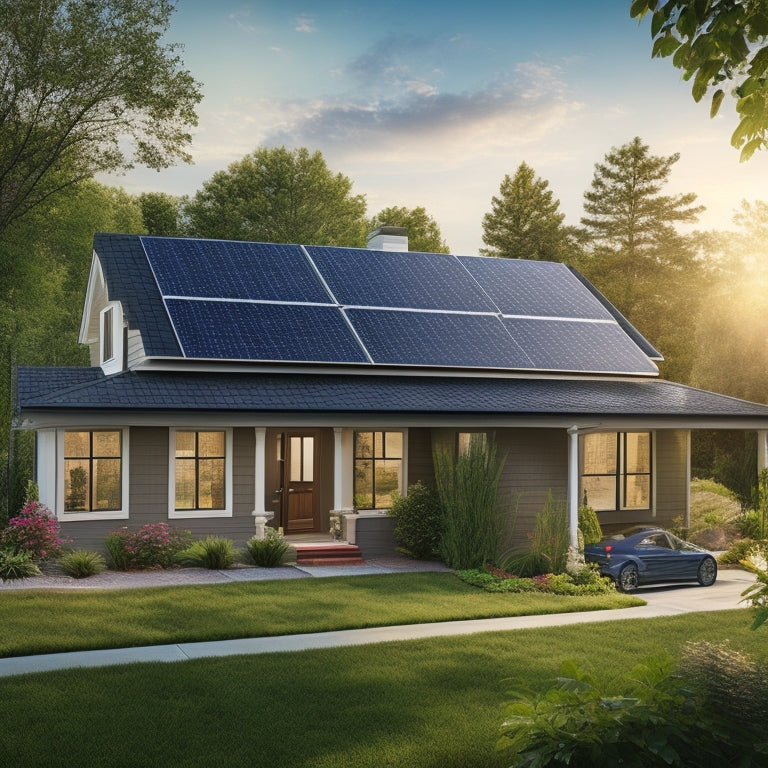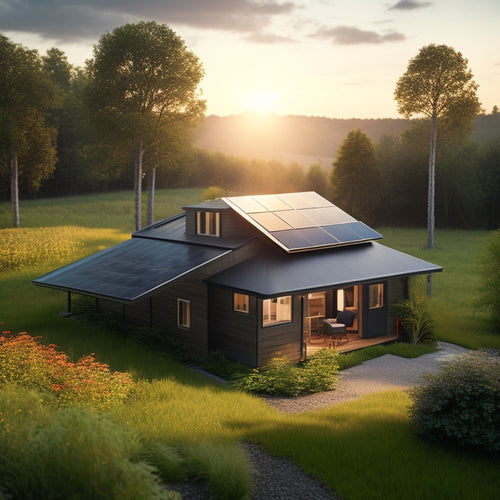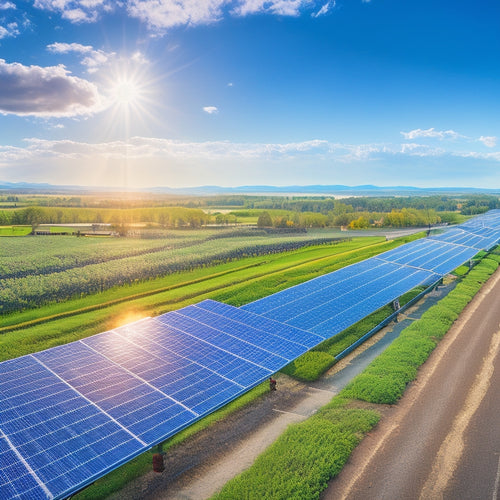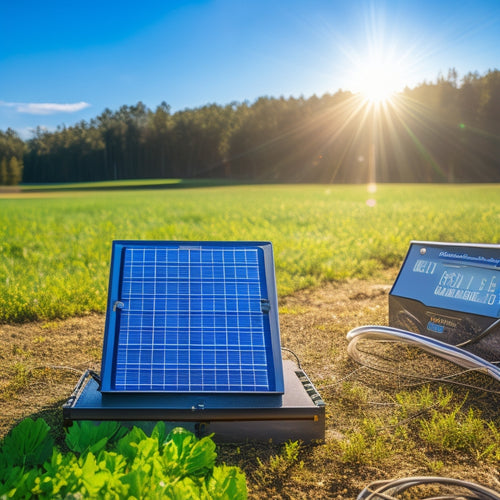
Top 3 Affordable DIY Solar Panel Kits for Homes
Share
You're looking for a DIY solar panel kit that's affordable and efficient. Consider kits from Renogy, HQST, and WindyNation, which offer high energy efficiency ratings and durable components. When selecting a kit, prioritize inverter type and mounting system sturdiness. With a DIY kit, you'll reap cost savings, minimize environmental impact, and achieve energy independence. Before getting started, plan your roof space, gather essential tools, and prioritize wiring safety. You're just a step away from harnessing clean energy - now, explore the details that'll get you started.
Key Takeaways
• Consider kits from Renogy, HQST, and WindyNation, prioritizing inverter type and mounting system sturdiness for a reliable DIY setup.
• Look for high energy efficiency ratings in solar panels to maximize energy output and reduce space requirements.
• Ensure durable and weather-resistant components to withstand various environmental conditions.
• Evaluate the compatibility of the mounting system with your roof type for a secure and efficient installation.
• Balance quality, affordability, and ease of installation when selecting a DIY solar panel kit for your home.
Top DIY Solar Panel Kit Picks
When contemplating DIY solar panel kits for your home, you'll want to explore the top picks that offer a balance of quality, affordability, and ease of installation. As you research, look for solar panels with high energy efficiency ratings, as they'll provide more power per hour of sunlight. A high-efficiency solar panel can save you space and increase your energy output.
Top DIY solar panel kits should include durable and weather-resistant components, ensuring your system withstands various environmental conditions. You'll also want to assess the inverter type, as it affects the system's overall efficiency. A high-quality inverter will maximize your energy production and reduce energy losses. Additionally, evaluate the kit's mounting system, ensuring it's sturdy and compatible with your roof type.
Some top picks include kits from renowned manufacturers like Renogy, HQST, and WindyNation. These brands offer reliable, efficient, and easy-to-install systems that cater to different energy needs and budgets.
Benefits of Affordable Solar Energy
By opting for a DIY solar panel kit, you'll not only reap the benefits of renewable energy but also enjoy significant cost savings, making solar energy a more affordable and attractive option for your home.
One of the most significant advantages of solar energy is its minimal environmental impact. Unlike traditional fossil fuels, solar energy is a clean and sustainable source of power, producing no emissions or pollution. By harnessing the sun's energy, you'll reduce your carbon footprint and contribute to a cleaner environment.
Moreover, solar energy provides energy independence, allowing you to generate your own power and reduce your reliance on the grid. This means you'll be less affected by fluctuating energy prices and can enjoy greater control over your energy usage.
With solar energy, you'll also increase your property value and potentially boost your home's resale value. Overall, investing in a DIY solar panel kit is a smart decision that benefits both your wallet and the environment.
Installation and Maintenance Tips
You'll need to carefully plan and prepare your roof space before installing a DIY solar panel kit to guarantee a safe and efficient setup. Make sure your roof is structurally sound, clear of debris, and free from shading obstacles.
Next, gather your Toolbox Essentials, including a drill, wire strippers, and a voltage tester.
When it comes to installation, prioritize Wiring Safety by following these essential steps:
-
Disconnect the main power supply to prevent electrical shock.
-
Label and organize cables to avoid confusion and ensure a neat setup.
-
Secure wiring with cable ties to prevent damage and tripping hazards.
- Perform a thorough inspection before switching on the system.
Frequently Asked Questions
Can I Install Solar Panels on a Shaded Roof?
"Ah, thou modern-day Renaissance person, thou askest if thy shaded roof can host solar panels? Fear not, for Roof Orientation and Shading Analysis can help determine viability, but expect reduced energy output, dear innovator."
Do Solar Panels Work During Power Outages?
You'll be glad to know that with a grid-tie system, solar panels won't work during power outages, but investing in a Grid Backup system or Emergency Power setup can guarantee continuous energy supply when you need it most.
Are DIY Solar Panel Kits UL Certified?
When shopping for DIY solar panel kits, it's important to verify that they're UL certified, which involves a rigorous certification process that confirms compliance with strict safety standards, giving you peace of mind and guaranteeing a safe installation.
Can I Expand My Solar Panel System Later?
As you begin your renewable energy journey, you'll be relieved to know that you can easily scale up your system later, like adding puzzle pieces, thanks to the concept of system scalability, allowing seamless energy upgrades.
Do Solar Panels Increase My Home's Value?
You'll be pleased to know that installing solar panels can boost your property's value through property appreciation, giving you a resale advantage when selling your home, as buyers increasingly prioritize eco-friendly features.
Related Posts
-

Diy Off Grid Solar
By embracing DIY off-grid solar, you can break free from grid dependence, slashing your energy bills by up to 90% and...
-

Applications of Photovoltaic Systems
Photovoltaic systems are versatile, converting sunlight into electricity for various applications. You can use them i...
-

Choosing the Right Solar Power Charge Controller
Choosing the right solar power charge controller is crucial for maximizing energy efficiency and extending battery li...


